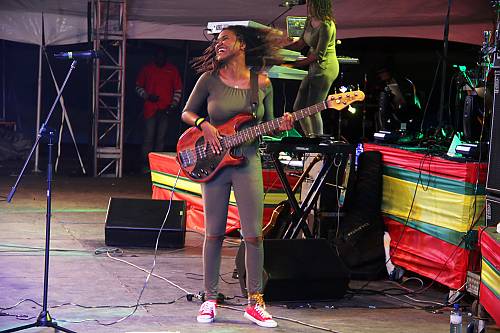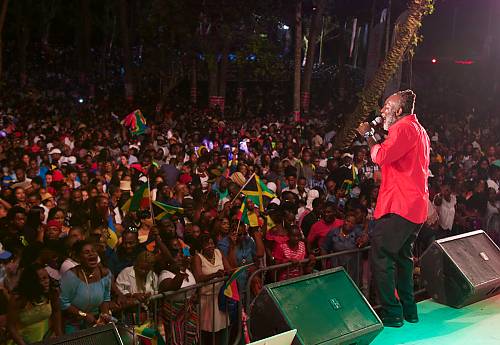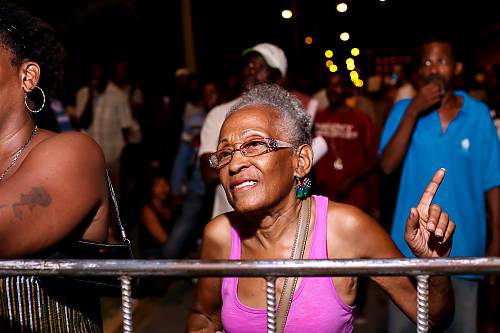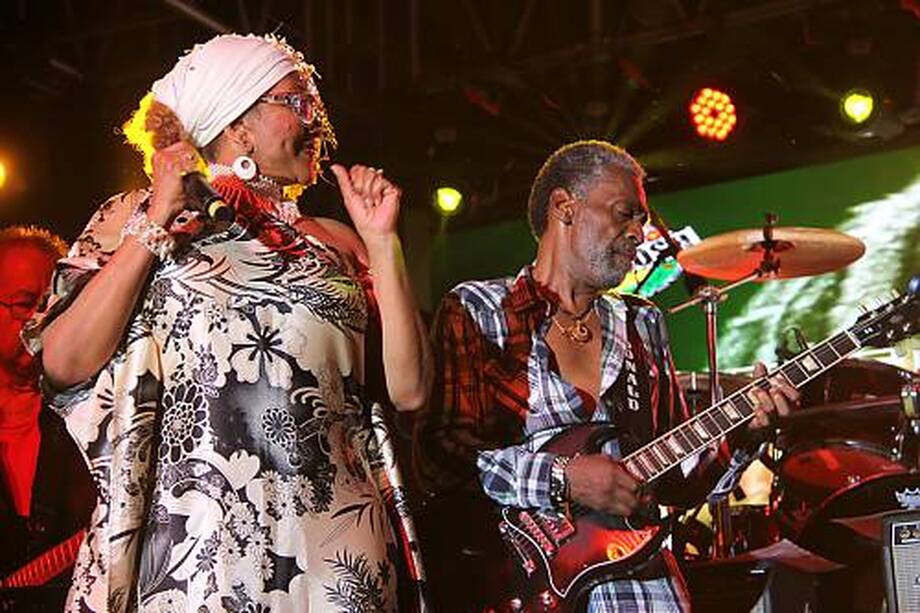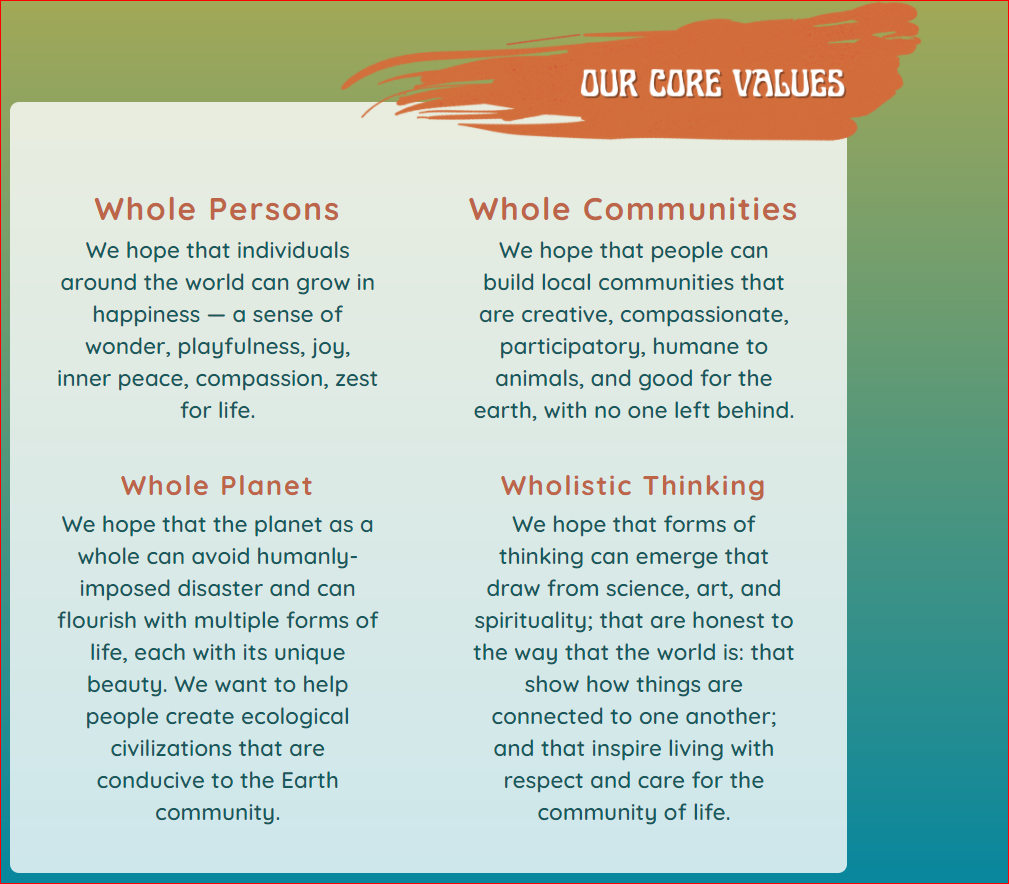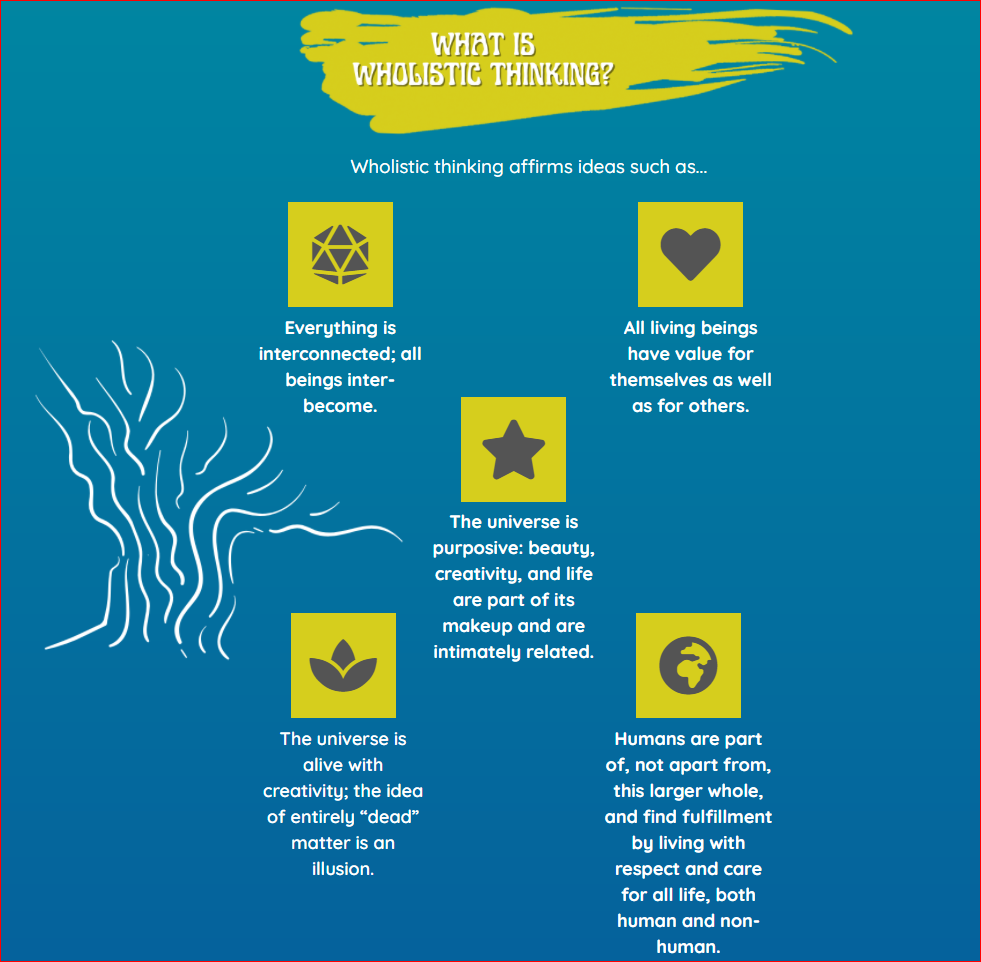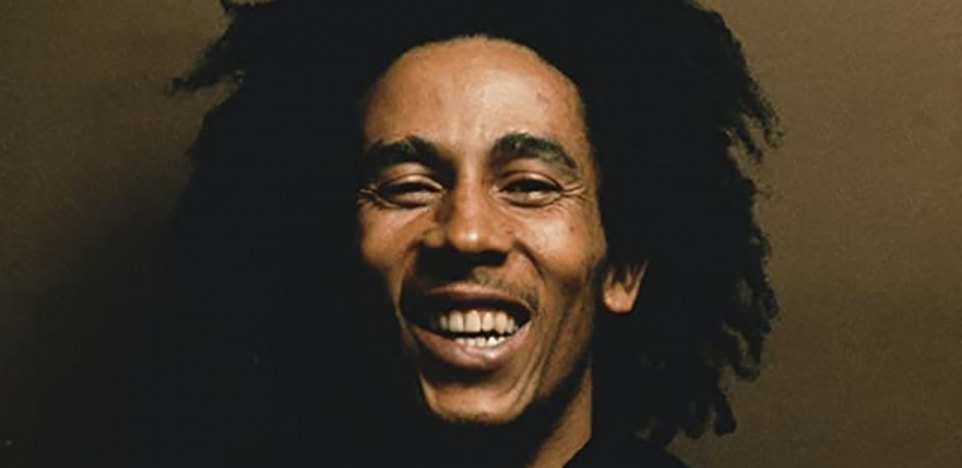- Home
- Process Worldview
- Community
- Art and Music
- Whitehead and Process Thinking
- Podcasts
- Spirituality
- Ecological Civilization
- Education
- Contact
- Social Justice
- Science
- Animals
- Sacred Poems
- Whitehead Videos
- Index of All Titles
- Practicing Process Thought
- Process Spirituality: A Spiritual Alphabet
- Recent Posts
One love, one heart
Let's get together and feel all right
Hear the children crying (one love)
Hear the children crying (one heart)
Sayin', "Give thanks and praise to the Lord and I will feel all right"
Sayin', "Let's get together and feel all right"
Whoa, whoa, whoa, whoa
Let them all pass all their dirty remarks (one love)
There is one question I'd really love to ask (one heart)
Is there a place for the hopeless sinner
Who has hurt all mankind just to save his own?
Believe me
One love (what about one heart?)
One heart (what about the love?)
Let's get together and feel all right
As it was in the beginning (one love)
So shall it be in the end (one heart)
Alright, give thanks and praise to the Lord and I will feel all right
Let's get together and feel all right
One more thing
Let's get together to fight this Holy Armageddon (one love)
So when the Man comes there will be no, no doom (one song)
Have pity on those whose chances grow thinner
There ain't no hiding place from the Father of Creation
Sayin', one love (what about the one heart?)
One heart (what about the?)
Let's get together and feel all right
I'm pleading to mankind (one love)
One heart (one heart) whoa
Give thanks and praise to the Lord and I will feel all right
Let's get together and feel all right
Give thanks and praise to the Lord and I will feel all right
Said let's get together and feel all right
UNESCO designates Reggae as
an Intangible Cultural Heritage
UNESCO, the cultural agency of the United Nations, has recognized Jamaica’s reggae music as contributing to “international discourse” issues, including those of injustice and resistance. The reggae music tradition has been described as “uniquely Jamaica” and its inclusion on the UNESCO intangible cultural heritage list highlights the need to preserve its worldwide popularity and voice for all people around the world. In adding reggae, UNESCO stated that the music tradition’s contribution to global discourse on injustice, resistance, love, and humanity emphasized how it is “at once cerebral, sociopolitical, sensual, and spiritual.”
- Stephanie Korney in Jamaicans.com
Reggae meets Process and Faith
Reggae from Jamaica is a process and a faith. A faith in one love, yes, and also in the need to critique and rebel against forms of colonialism (racial, economic, psychological, cultural) that inhibit the very possibility of one love.
As a process reggae is always becoming something new, albeit with three persistent currents. It is (1) a social message of protest and hope, exile and return: a form of rebellian with rhythm. It is (2) an ebullient and infectious sound that everyone can feel and understand, making them feel happy even if they are sad. And it is (3) an ongoing reminder of struggles, beauty and vitality of Jamaica, especially among disenfranchised youth in West Kingston where it began. Reggae always goes back to Jamaica.
Reggae is also an infectious faith. Its faith is that, with words and music, not guns and bombs, people can resist colonization, enjoy life, dwell in community together, and make a constructive difference in the world. This faith is not namby-pamby. As Bob Marley put it, reggae is not just for jollification. It is music that calls us to a higher standing and sense of purpose in life. It speaks to who we can become, if only we let greed and hatred drop away.
And what might this higher calling be? Perhaps it looks like the four key values of Process and Faith: a multi-religious network committed to the common good of the world. The four key values are: (1) whole persons, (2) whole communities, (3) a whole planet, and (4) wholistic thinking. My suggestion is that these value are deepened, widened, enriched and amplified by the faith of reggae.
- Jay McDaniel
As a process reggae is always becoming something new, albeit with three persistent currents. It is (1) a social message of protest and hope, exile and return: a form of rebellian with rhythm. It is (2) an ebullient and infectious sound that everyone can feel and understand, making them feel happy even if they are sad. And it is (3) an ongoing reminder of struggles, beauty and vitality of Jamaica, especially among disenfranchised youth in West Kingston where it began. Reggae always goes back to Jamaica.
Reggae is also an infectious faith. Its faith is that, with words and music, not guns and bombs, people can resist colonization, enjoy life, dwell in community together, and make a constructive difference in the world. This faith is not namby-pamby. As Bob Marley put it, reggae is not just for jollification. It is music that calls us to a higher standing and sense of purpose in life. It speaks to who we can become, if only we let greed and hatred drop away.
And what might this higher calling be? Perhaps it looks like the four key values of Process and Faith: a multi-religious network committed to the common good of the world. The four key values are: (1) whole persons, (2) whole communities, (3) a whole planet, and (4) wholistic thinking. My suggestion is that these value are deepened, widened, enriched and amplified by the faith of reggae.
- Jay McDaniel
Core Values of Process and Faith
Rastafari
The Process and Faith network celebrates Afro-Caribbean religions as among the many faiths that can contribute to a more whole world, including Rastafari, which has so influenced Reggae. Here's how the Harvard Pluralism Project presents Rastafari:
The most famous Jamaican religion is undoubtedly Rastafari, a complex spiritual and political movement that emerged in Jamaica during the depression years of the 1930s. It combined inspirational Jamaican folk Christianity with pan-Africanist sentiments inspired by Marcus Garvey’s United Negro Improvement Association. In repudiating British colonialism, Rastafaris were inspired by Ethiopia, noted as the one land of Africa mentioned in the Bible. Ethiopia’s 20th century emperor Haile Selassie, “the Lion of Judah,” was believed by Rastafaris to be the 225th king of biblical Ethiopia; they took Haile Selassie’s name, Ras Tafari, the “Prince of Tafari Province,” as their own. Garvey’s dream of a return to Africa became the Rastafari dream as well, and some Rastafaris have indeed settled in Ethiopia, Ghana, and Zaire.
Rastafaris interpret the Old Testament as the history of the Black people and as a prophetic key to understanding events in the modern world. They see themselves as successors to the biblical prophets and, like devotees of Jamaican Revivalist movements, often speak as the present-day voices of biblical prophets such as Moses, Joshua, and Isaiah. The characteristic Rastafari hairstyle, locs (dreadlocks), is said to symbolize both the lion’s mane and the strength of Samson. Some Rastafaris believe that African warriors wear their hair in a similar style. The sacramental use of marijuana among Rastafaris is believed to bring divine inspiration, to cure diseases, and to enhance strength.
In the United States, the rhythm of Rastafari reggae music has become one of the best known aspects of this Jamaican religious tradition. The lyrics, like the Rastafari lifestyle, often include a strong note of social protest as well as the dream of returning to the biblical Ethiopia. As Bob Marley sings,
We are the children of the Rastaman.
We are the children of the Higher Man.
Africa, Unite ’cause the children wanna come home.
Africa, Unite ’cause we’re moving right out of Babylon.
And we’re grooving to our father’s land.
Just as Rastafari identification with the biblical Ethiopia was a strong form of resistance to British colonial society in the 1930s, so today Rastafari protest affirms African identity in the face of Eurocentric Jamaican and American cultures.
- Harvard Pluralism Project
As this makes clear, faith of reggae is a faith against Eurocentric Jamaican and American cultures and a faith for human liberation of people in all cultures for that higher calling of which Bob Marley speaks. Thus reggae includes the two sides of what the biblical scholar Walter Brueggemann calls the prophetic imagination: a prophetic "no" to the status quo of injustice and a prophetic "yes" to a better way of living where none are left behind. Rastafari itself, like Reggae, includes the "no" and the "yes."
Ultimately Reggae is an invitation for us all: an invitation to leave the Babylon of colonized consciousness and politics and find our way into truly compassionate communities that are creative, compassionate, participatory, inclusive, diverse, humane to animals, and good for the earth - with no one left behind.
What lies behind this dream of One Love? Many in the Process and Faith Network call it God: the lure toward creative transformation at work in the world. In Rastafari this reality is sometimes called Jah or Jah Jah. The names don't matter. It's the spirit that counts. But Jah sure sounds good and, for some, can introduce novelty into a kind of theological that too often grows stale, masking the reality of one love by the word "God."
- Jay McDaniel
A Sample of Jamaican Reggae Music
Dreamland * |
There's a land that I have heard about
So far across the sea (repeat) To have you all, my dreamland Would be like heaven to me (repeat) We'll get our breakfast from the tree We'll get our honey from the bees We'll take a ride on the waterfalls And all the glories, we'll have them all And we'll live together on that dreamland And have so much fun (repeat) Oh, what a time that will be Oh yes, we'll wait, wait, wait and see We'll count the stars up in the sky. And surely we'll never die |
Toots Hibbert's Spiritual Healing
A celebration of the reggae music of
the lead singer of Toots & the Maytals.
Art Feature by Frederic and Mary Ann Brussat,
reposted from Spirituality and Practice.
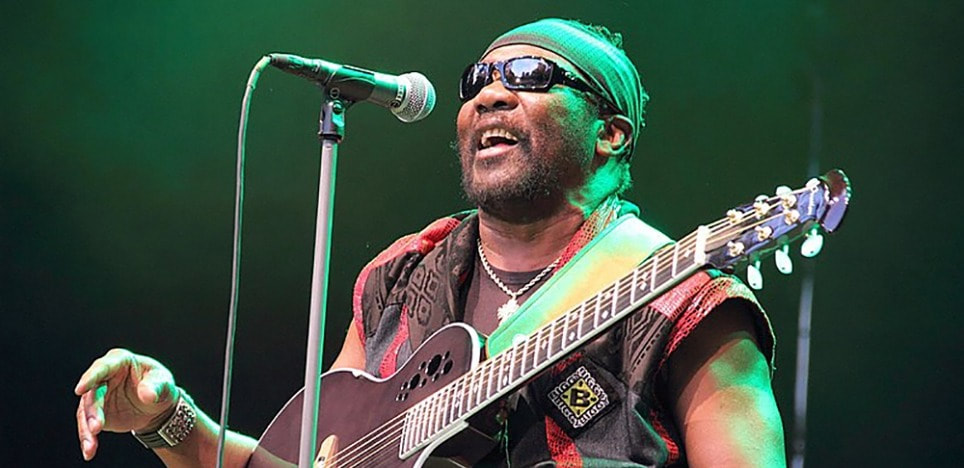
Loyal fans of reggae music have been shocked to hear of the death of Jamiacan reggae singer Toots Hibbert on September 11, 2020, at the age of 77. Although no official cause of death was announced, the band said he had been taken to intensive care a week earlier and was awaiting the results of a COVID-19 test.
He brought reggae to the masses and claimed to have coined the term itself in his 1968 song "To the Reggay." After many years of recording albums and touring the world, Toots & the Maytals won the 2005 Grammy Award for Best Reggae album for True Love. This popular release paid tribute to reggae with such hits as "Pressure Drop," "Reggae Got Soul," and "Funky Kingston." Throughout his career the singer also created unique covers of such popular tunes as John Denver's "Take Me Home, Country Roads" and Richard Berry's "Louie Louie."
Here are our favorites from Toots and the Maytals with links to YouTube videos:
He brought reggae to the masses and claimed to have coined the term itself in his 1968 song "To the Reggay." After many years of recording albums and touring the world, Toots & the Maytals won the 2005 Grammy Award for Best Reggae album for True Love. This popular release paid tribute to reggae with such hits as "Pressure Drop," "Reggae Got Soul," and "Funky Kingston." Throughout his career the singer also created unique covers of such popular tunes as John Denver's "Take Me Home, Country Roads" and Richard Berry's "Louie Louie."
Here are our favorites from Toots and the Maytals with links to YouTube videos:
- "Reggae Got Soul" (1976), a spunky, top-tapping song where Toots sounds like an inspired preacher.
- "Time Tough" (1975), a harrowing portrait of poverty in Trenchtown.
- "Funky Kingston" (1972) celebrates the power of music with its inimitable beat.
- "Pressure Drop" (1969) was a huge hit for Toots & the Maytals, thanks to its inclusion on the soundtrack of The Harder They Come.
- "54-44 Was My Number" (1968) showcases Toots' great soul singing.
- "Spiritual Healing" (1983) celebrates the power of love to wipe away bad feelings and replace them with good ones. Just read the lyrics, and you'll see why this is one of our favorite spiritual songs of all time.
Marley
Directed by Kevin Macdonald
An astonishing documentary charting the life
and legacies of reggae superstar Bob Marley.
Film Review by Frederic and Mary Ann Brussat,
reposted from Spirituality and Practice
Bob Marley began his life as a poor country boy in Jamaica on February 6, 1945, and died of cancer in Miami on May 8, 1981. In his brief 36-year lifetime he created reggae music and made it popular around the world. He espoused Rastafarian religion and became a prophet of a message of unity of all peoples. More than 20 million of his records have been sold, and one of them, Legend, continues to sell at a rate of 250,000 albums a year.
"Emancipate yourselves from mental slavery,
None but ourselves can free our mind."
— Bob Marley's "Redemption Song"
This extraordinary documentary on Marley's life and legacy is directed by Kevin Macdonald who was at the helm of the global crowd-sourced documentary Life in a Day. Thanks to this film's 144-minute running time, Macdonald is able to do justice to the complexity of Marley's career using concert and studio footage and a lively mix of commentaries by more than 60 of his family, friends, fellow musicians, producers, and others. Key insights into his musical contributions are offered by Neville "Bunny" Livingston of The Wailers, and Nevile Garrick, The Wailers' artistic director. We see how the singer/songwriter's music evolved over the years, and we also, thanks to the support of the Marley family, have unusual access to behind-the-scenes stories of his daily life. From the memories of his cousin who still lives in the village where Bob was born to his children's comments on their father's parenting style, we see the man behind the legend.
"Cause I remember when we used to sit
In a government yard in Trench Town
Observing the hypocrites
Mingle with the good people we meet."
— Bob Marley's "No Woman No Cry"
Marley's parents were a black teenage mother and an older white man who was not around to share his son's childhood and youth. The boy was bullied at school and hated by many of his peers for his mixed race heritage. Marley never got over being forced into the role of outsider.
In the late 1950s, he and his mother moved to Kingston and lived in Trench Town, a slum. Marley polished his singing talents and released his first single in 1962 titled "Judge Not." He joined with Bunny Livingston and Peter Tosh to form a group called The Wailing Wailers. One of the many little stories that are sprinkled throughout this film relates that the group used to practice by singing for the spirits in the cemetery so they wouldn't be afraid on stage. Their single "Simmer Down" shot to the top of the charts in 1964. Feeling good about his prospects, he married Rita Anderson in 1966. A song he wrote for her, "Stir It Up" became wildly popular as one of the earliest examples of reggae. In a fascinating section of the documentary, musicians discuss how this style of music with its rhythmic accents on the off-beat was discovered almost by accident in Jamaican studios.
In 1972, Marley and The Wailers signed a contract with Island Records in London and released their first album Catch a Fire. It was followed by Burnin which contained the song "I Shot the Sheriff." Rock superstar Eric Clapton made the ballad a smash hit in America with his version of it. A concert at the Lyceum in London in 1995 is called a "tipping point" in Marley's career as an international sensation.
"Be not selfish in your doings
Pass It On
Help your brothers in their needs,
Pass It On."
— Bob Marley's "Pass It On"
During the 1970s Marley got very interested in the Rastafarian movement which emphasized the teachings of black nationalist Marcus Garvey, the Old Testament, a strict code of behavior, African roots, and a heightened critique of Babylon (materialism). Marley the Rasta preacher wrote and sang reggae ballads about war, revolution, and poverty.
Jamaica during this period was the scene of often violent clashes between followers of different political parties. Marley, now a cult figure around the world, was shot and wounded in 1976, an action attributed to the political strife. Two years later he gave a free concert to 80,000 people in Kingston with the intention of bringing the two leaders of battling factions together.
Marley's album Exodus was heralded as a landmark for the artist with its thematic richness. Time spent in Africa, which Rastafarians regard as their true homeland, had a deepening effect on the reggae superstar. Marley and his band played in the official independence day ceremony in Zimbabwe in 1980 as a token of their high hopes for more freedom on the continent. Also in the same year, Marley and The Wailers hit the top of the charts again with Uprising, an inspiring and enlightening album.
"Why not help one another on the way
Make it much easier
Say you just can't live that negative way
You know what I mean'
Make way for the positive day"
— Bob Marley's "Positive Vibrations"
While on tour in the United States in 1980, Marley learned that he had cancer throughout his body. He sought treatment at a holistic center in Germany, but eventually was told that nothing more could be done for him and he decided to go back to Jamaica. He died during a layover in Miami. More than 30,000 people attended the state funeral in Jamaica.
Every time a reggae song is played, Bob Marley can take credit for ushering into the world this infectiously syncopated, laid-back music and its positive vibrations. The closing montage of the film is an inspiring portrait of how far his "one love" reaches to this day.
Special features on the DVD include "Around the World"; an extended interview with Neville "Bunny" Livingston of The Wailers; "Children's Memories": additional interviews with David "Ziggy" Marley, Stephen Marley, and Cedella Marley; Listening to "I'm Loose"; a photo gallery; and a commentary with director Kevin Macdonald and David "Ziggy" Marley.
"Emancipate yourselves from mental slavery,
None but ourselves can free our mind."
— Bob Marley's "Redemption Song"
This extraordinary documentary on Marley's life and legacy is directed by Kevin Macdonald who was at the helm of the global crowd-sourced documentary Life in a Day. Thanks to this film's 144-minute running time, Macdonald is able to do justice to the complexity of Marley's career using concert and studio footage and a lively mix of commentaries by more than 60 of his family, friends, fellow musicians, producers, and others. Key insights into his musical contributions are offered by Neville "Bunny" Livingston of The Wailers, and Nevile Garrick, The Wailers' artistic director. We see how the singer/songwriter's music evolved over the years, and we also, thanks to the support of the Marley family, have unusual access to behind-the-scenes stories of his daily life. From the memories of his cousin who still lives in the village where Bob was born to his children's comments on their father's parenting style, we see the man behind the legend.
"Cause I remember when we used to sit
In a government yard in Trench Town
Observing the hypocrites
Mingle with the good people we meet."
— Bob Marley's "No Woman No Cry"
Marley's parents were a black teenage mother and an older white man who was not around to share his son's childhood and youth. The boy was bullied at school and hated by many of his peers for his mixed race heritage. Marley never got over being forced into the role of outsider.
In the late 1950s, he and his mother moved to Kingston and lived in Trench Town, a slum. Marley polished his singing talents and released his first single in 1962 titled "Judge Not." He joined with Bunny Livingston and Peter Tosh to form a group called The Wailing Wailers. One of the many little stories that are sprinkled throughout this film relates that the group used to practice by singing for the spirits in the cemetery so they wouldn't be afraid on stage. Their single "Simmer Down" shot to the top of the charts in 1964. Feeling good about his prospects, he married Rita Anderson in 1966. A song he wrote for her, "Stir It Up" became wildly popular as one of the earliest examples of reggae. In a fascinating section of the documentary, musicians discuss how this style of music with its rhythmic accents on the off-beat was discovered almost by accident in Jamaican studios.
In 1972, Marley and The Wailers signed a contract with Island Records in London and released their first album Catch a Fire. It was followed by Burnin which contained the song "I Shot the Sheriff." Rock superstar Eric Clapton made the ballad a smash hit in America with his version of it. A concert at the Lyceum in London in 1995 is called a "tipping point" in Marley's career as an international sensation.
"Be not selfish in your doings
Pass It On
Help your brothers in their needs,
Pass It On."
— Bob Marley's "Pass It On"
During the 1970s Marley got very interested in the Rastafarian movement which emphasized the teachings of black nationalist Marcus Garvey, the Old Testament, a strict code of behavior, African roots, and a heightened critique of Babylon (materialism). Marley the Rasta preacher wrote and sang reggae ballads about war, revolution, and poverty.
Jamaica during this period was the scene of often violent clashes between followers of different political parties. Marley, now a cult figure around the world, was shot and wounded in 1976, an action attributed to the political strife. Two years later he gave a free concert to 80,000 people in Kingston with the intention of bringing the two leaders of battling factions together.
Marley's album Exodus was heralded as a landmark for the artist with its thematic richness. Time spent in Africa, which Rastafarians regard as their true homeland, had a deepening effect on the reggae superstar. Marley and his band played in the official independence day ceremony in Zimbabwe in 1980 as a token of their high hopes for more freedom on the continent. Also in the same year, Marley and The Wailers hit the top of the charts again with Uprising, an inspiring and enlightening album.
"Why not help one another on the way
Make it much easier
Say you just can't live that negative way
You know what I mean'
Make way for the positive day"
— Bob Marley's "Positive Vibrations"
While on tour in the United States in 1980, Marley learned that he had cancer throughout his body. He sought treatment at a holistic center in Germany, but eventually was told that nothing more could be done for him and he decided to go back to Jamaica. He died during a layover in Miami. More than 30,000 people attended the state funeral in Jamaica.
Every time a reggae song is played, Bob Marley can take credit for ushering into the world this infectiously syncopated, laid-back music and its positive vibrations. The closing montage of the film is an inspiring portrait of how far his "one love" reaches to this day.
Special features on the DVD include "Around the World"; an extended interview with Neville "Bunny" Livingston of The Wailers; "Children's Memories": additional interviews with David "Ziggy" Marley, Stephen Marley, and Cedella Marley; Listening to "I'm Loose"; a photo gallery; and a commentary with director Kevin Macdonald and David "Ziggy" Marley.
